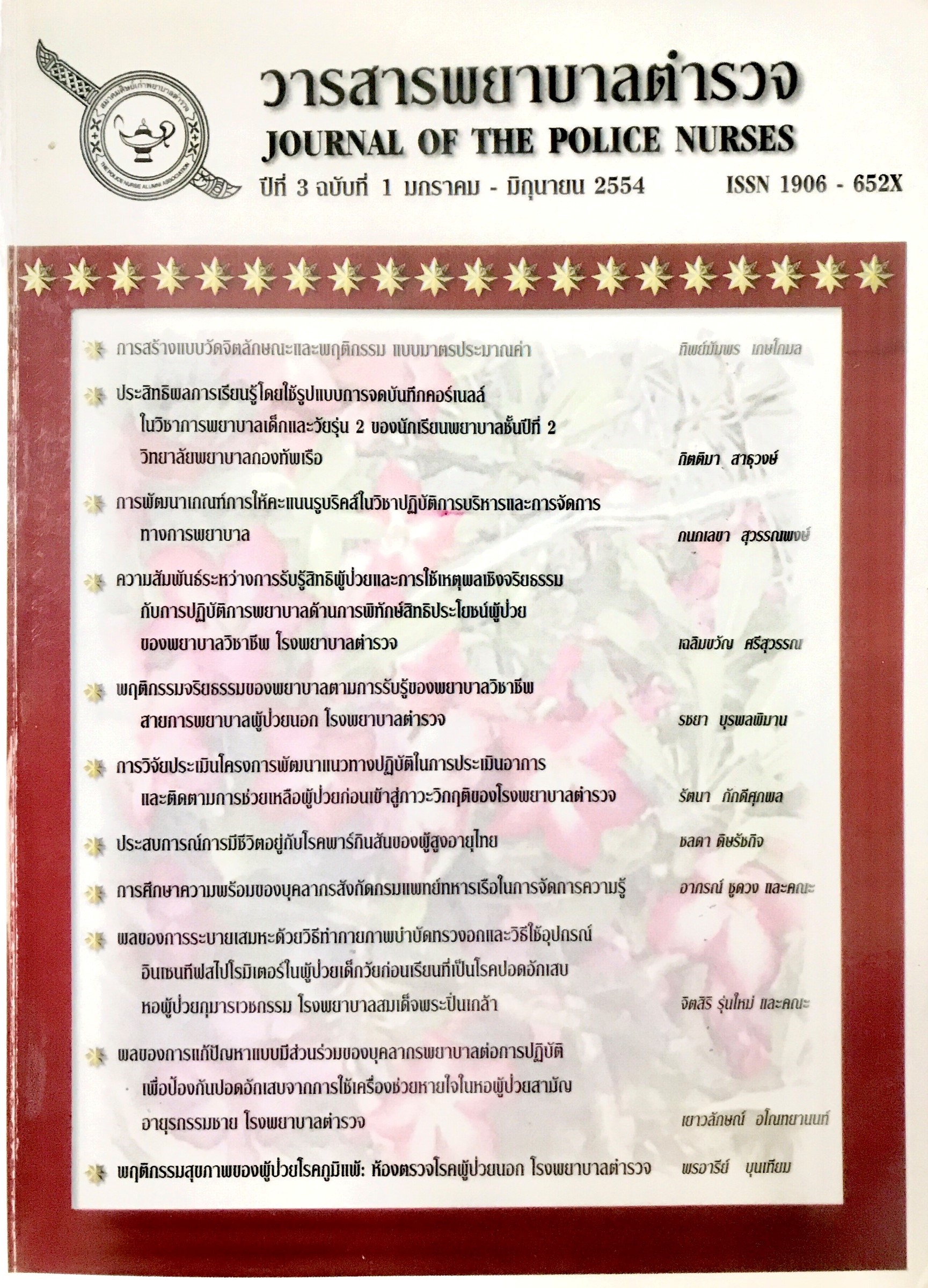ประสบการณ์การมีชีวิตอยู่กับโรคพาร์กินสันของผู้สูงอายุไทย
Keywords:
ประสบการณ์, ผู้สูงอายุไทย, โรคพาร์กินสัน, Experiences, Thai Elderly, Parkinson DiseaseAbstract
บทคัดย่อ
การวิจัยครั้งนี้เป็นการวิจัยเชิงคุณภาพโดยใช้รูปแบบตามแนวคิดปรากฏการณ์วิทยาของ Husserl มีวัตถุประสงค์เพื่อบรรยายความหมายและประสบการณ์การมีชีวิตอยู่กับโรคพาร์กินสันของผู้สูงอายุไทย ผู้ให้ข้อมูลหลักในการวิจัยครั้งนี้ ได้แก่ ผู้สูงอายุไทยที่เป็นโรคพาร์กินสัน จำนวน 23 ราย เก็บรวบรวมข้อมูล โดยการสัมภาษณ์แบบเจาะลึก และการบันทึกเทป นำข้อมูลที่ได้ มาถอดความแบบคำต่อคำ วิเคราะห์ข้อมูลตามวิธีการของ Colaizzi
ผลการวิจัย พบว่า ผู้สูงอายุไทยให้ความหมายของการมีชีวิตอยู่กับโรคพาร์กินสันว่าเป็นชีวิตที่ต้องเผชิญกับโรคที่มีอาการไม่แน่นอน เกิดอาการขึ้นได้ทุกขณะ ไม่สามารถควบคุมอาการได้ และเป็นชีวิตที่ต้องอยู่กับโรคที่ทำให้ชีวิตไร้ค่า รู้สึกคุณค่าของตนเองลดลง เป็นปมด้อย และเป็นภาระกับผู้อื่น ส่วนประสบการณ์การมีชีวิตอยู่กับโรคพาร์กินสัน พบประเด็นหลักที่เกี่ยวข้อง 4 ประเด็น ได้แก่ 1) การอยู่กับข้อจำกัดในการดำเนินชีวิต ทั้งการปฏิบัติกิจกรรรมและการเปลี่ยนแปลงทางอารมณ์และจิตใจ 2) การอยู่ด้วยการทำใจยอมรับ ตั้งสติ คิดด้านบวก การนำศาสนามาเป็นที่ยึดเหนี่ยวทางใจ และการปรับลดบทบาทในครอบครัวและสังคม 3) การอยู่ด้วยการหาวิธีดูแลสุขภาพ โดยปฏิบัติตามคำแนะนำของแพทย์ เพื่อป้องกันไม่ให้ล้ม ไม่ให้ท้องผูก หลีกเลี่ยงความเครียด/โกรธ/ความรู้สึกตื่นเต้น คิดหาวิธีการดูแลสุขภาพด้วยตนเอง การรักษาด้วยแพทย์ผู้เชี่ยวชาญ หาวิธีบำบัดอาการด้วยการแพทย์ทางเลือก และปรับกิจกรรมชีวิตตามช่วงการออกฤทธิ์ของยา และ 4) การอยู่ด้วยความหวังและกำลังใจในการมีชีวิต ความหวังที่จะมีชีวิตที่ดีขึ้นหลังรักษาและหายจากโรค ความหวังให้คนรอบข้างเข้าใจและดูแลเพิ่มขึ้น ความหวังให้มีการแลกเปลี่ยนเรียนรู้ระหว่างผู้ป่วยและผู้ดูแล
Experiences of Living with Parkinson disease of Thai elderly
Abstract
A qualitative research method of Husserl phenomenology was carried for the purpose of exploring the meaning and experiences of Thai elderly patients in living with Parkinson disease. The key informants were 23 Thai elderly people with Parkinson disease. Data were collected by in-depth interviews with tape recording and verbatim transcription. The Colaizzi’s method was applied for data analysis.
The major results showed that the informants perceived their illness with Parkinson disease as leading their lives with a disease that has uncertain symptoms, can occur unexpectedly at any time in a life with disease, devalues life, reduces self-esteem, is point inferiority and is a burden to others. Experiences in living with Parkinson disease, the following four major themes were emerged to be involved: 1) Living with life style deficit, activities limitations, emotional and psychological changes, 2) Living with methods of acceptance, mental relaxation focus, positive thinking and using religion as emotional support and reduced roles in family and society, 3) Living with self-care seeking behavior by following the recommendation of doctors to prevent fall and constipation, to avoid stress/anger/excitement, to think of self care methods, to receive treatment by specialists, to implement selected alternative medicine to release the symptoms of illness, and to adjust the activities of daily living under the effects of medical cycle, and 4) Living with hopes and encouragement for life, hope to have a better life after treatment, be cured from the disease to get more care and understanding from cousins, and to share information between patients and caregivers.
Downloads
Downloads
How to Cite
Issue
Section
License
ผลงานที่ได้ตีพิมพ์แล้วจะเป็นลิขสิทธิ์ของวารสารพยาบาลตำรวจ















